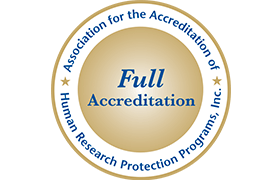AAHRPP Accreditation

Human Research Protection
The Human Research Protection Program (HRPP) is responsible for providing administrative and regulatory support to the Drexel University Institutional Review Boards (IRB). HRPP provides guidance on the responsible conduct of human research to Drexel's IRB members, faculty, investigators and their research assistants. HRP guidance documents and forms ensure compliance to local, state and federal regulations.
Resources
Revised Common Rule (Final Rule)
The Revised Common Rule was initially issued on January 19, 2017 with an intended implementation date of January 19, 2018. As you may know, the implementation was delayed twice in the last year. The final implementation and compliance date is now January 21, 2019.
The revisions are not applicable to FDA and Department of Justice regulated research. The FDA plans to post a notice of draft revised FDA regulations intended to harmonize with the revised rule. If you are involved in the conduct of FDA-regulated research, you should be aware that these changes may be directly applicable to your research in the future. We will let you know if and when those changes occur.
Limited IRB Review for Exemption Categories
Human Research Ethics
Drexel University strives to adhere to the highest ethical standards in its protection of human research participants in addition to ensuring compliance with all relevant federal regulations and state laws. Human research is research conducted with or about people, or their data or tissues, with the sole intention to do good.
Research ethics govern the standards of conduct for scientific researchers. It is important to adhere to ethical principles in order to protect the dignity, rights and welfare of research participants. All human beings are born free and equal in dignity and rights. Drexel University respects cultural context and ethical relativism in relation to the norms of the culture in which the research is being conducted as well as the focus of right or wrong pending on the consequences (outcomes) of the project. Ethical conduct involves acting in the right spirit, and takes into account the interest of others.
Human research involves significant risks, and it is possible to make mistakes. Despite the best of intentions and care in planning and practice, mishaps occur. Casualties may arise because of technical errors or an ethical insensitivity, neglect or disregard.
Historical Context
On rare occasions, the practice of research has even involved deliberate and appalling violation of human beings. Earlier, in the 1900s, there were no regulations regarding the ethical use of human subjects in research. Atrocities such as The Nuremberg Nazi Doctor's Trial, Tuskegee Syphilis Study, Willowbrook Hepatitis Experiments [PDF], Thalidomide Tragedy, and Guatemala Syphilis gave rise to the Nuremberg Code [PDF], Declaration of Helsinki [PDF], Good Clinical Practice (GCP), Belmont Report and The Common Rule.
Rules and regulations were developed to protect human research subjects. The need for research institutes to have an institutional review board (IRB) became a necessity. All research involving human subjects should be reviewed by an IRB to ensure that the appropriate ethical standards are being upheld. The Belmont Report is a statement of the basic ethical principles and guidelines that assist in resolving the ethical problems that surround the conduct of research with human subjects. The three basic ethical principles (beneficence, justice and autonomy), and their corresponding applications are central to ethical review. At Drexel University, the Belmont report is the foundation and principal guidelines for our Institutional Review Board (IRB).